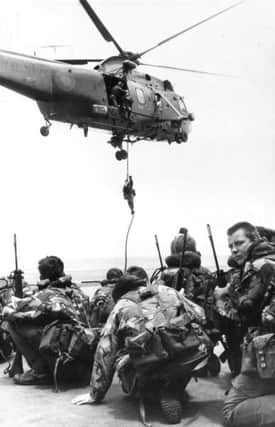Jim Duffy: Leadership gurus could learn a lot from Marines


This week, I got to meet someone whom I had been writing about in the new Entrepreneurial Spark book, coming out soon. I had researched and read all about him as I wrote about grit and what it meant. This week, I got to meet a Royal Marine Company Commander, who, along with the rest of 45 Commando Royal Marines, fought in the Falklands War… and won. For 90 minutes I was transfixed by the passion, presence, knowledge and sheer indefatigable will of Ian Gardiner.
There are moments or episodes in one’s life that shape us. They conjure up vivid memories. One of these for me was the Falklands War. There is no doubt in my mind that this was ‘my’ war. What I mean by that is that every evening I would come home from school as a young teenager and watch the news coverage of the conflict on television. Like many families then, we were privileged to have a colour TV, the box being the primary entertainment of an evening. From John Pertwee in Dr Who to Bruce Forsyth in the Generation Game (“Give us twirl, Anthea”), and The Two Ronnies and Nationwide, I was shaped by what was transmitted into my living-room. This is one gadget I was really pleased my old dad liked to spend his cash on.
Advertisement
Hide AdAdvertisement
Hide AdThe Falklands War was real and I could watch it unfold. I watched Margaret Thatcher full of stoical rhetoric talk up Britain and make sure we all knew she was up for the bloody fight. I watched the Task Force leave Britain with Royal Navy ships packed with soldiers and equipment. Cruise ships like the Canberra had been transformed into military cruisers carrying supplies, men and anything else that was needed to fight a battle 8,000 miles away. I saw wives, mothers and sisters all on the quayside waving furiously at departing loved ones. I saw Harrier jump jets go out and fight missions and then come home having deposited their payloads. I saw ships on fire that had been attacked by Argentinian Exocet missiles. I saw carnage and chaos and a whole lot more as I ate my mince and tatties for tea.
But only now do I realise and appreciate what these men did and the attitude they had. As I chatted to Ian Gardiner, who at 67 could have cut me in two with one blow if he had chosen to, I could feel the true spirit of a fighting man and, as he was quick to point out, women now also.
He made it clear that he and the chaps were not going down there to play games. They were Marines and they fought to win, not just have a go. Can I maybe take this moment to say to you that I don’t think there is anything more formidable than a company of well-trained and motivated Royal Marines coming at you with one thing in mind – to win. They proved that in bucketloads.
The Marines, like all British armed forces, are patriotic – Queen and country and all that. But, there is one thing that really sets all military folks apart. It’s called trust. Trust in the training. Trust in the leadership and their respective commanding officers. Trust in the equipment. But, what makes all the difference, is trust in the man lying next to you when the bullets start flying and the mortars fall on your position. Each and every man – Gardiner told me – would do anything for the man next to them. They would think for each other, work for each other and in many cases get wounded and die for each other. No ego or playing politics. Politics, unfortunately, don’t work on the battlefield. It’s too late then. Each Marine knew the mission and knew where they fitted in helping each other, their section, troop and company achieve that goal.
I took many things from Ian Gardiner this week. But, as I consider what leadership means and looked on Linkedin, the social networking site for business, at so many gurus who talk about ‘leadership’, ‘motivating people and teams’ and ‘installing cultures of leadership’, nothing hits the mark more than the leadership that permeates the ranks of the Royal Marines.
Gardiner was clear that as commanding officer, he was the chief servant to his men. They had to trust him to do the business and he had to trust them throughout the chaos of the battlefield to make decisions for the good of the mission. In clearly catastrophic situations, the Marine mindset is all about helping others to cut through and win.
My question is: how do we capture and translate this amazing ethos into other areas of life? Whether it be business or otherwise, how do we shape people to adopt a Marine mindset? It’s not all about war or preparing for war. It’s about covering other’s backs and not grandstanding when the chips are down.
Folks, I met a real life hero this week. One from my TV screen many years ago. I just hope some of his magic and that Marine mindset rubs off on me….